Resources for advocates and decisionmakers
Factsheets, briefs and other tools that policymakers, decisionmakers and other advocates can use in their work to promote legal abortion, to support local champions for abortion rights and to train police, judges and lawyers, and other professionals on how to protect these rights.
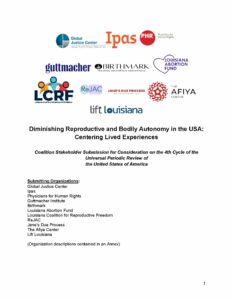
view pdf Resources for advocates and decisionmakers Abortion restrictions are incompatible with international human rights law. The U.S. government’s failure to ensure the provision of safe, legal, and accessible health care, including abortion, violat …
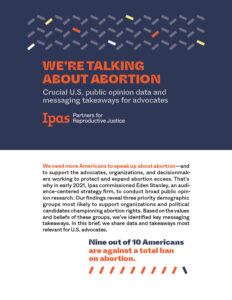
We need more Americans to speak up about abortion—and to support the advocates, organizations, and decisionmakers working to protect and expand abortion access. That’s why Ipas worked with Eden Stanley, an audience-centered firm, to conduct broad public opinion research. Our findings reveal three priority demographic groups most likely to support organizations and political candidates championing abortion rights. Based on the values and beliefs of these groups, we’ve identified key messaging takeaways. In this brief, we share data and takeaways most relevant for U.S. advocates.
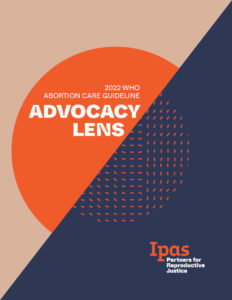
This resource is intended to support advocates who are working to achieve universal access to comprehensive, person-centered abortion care and an enabling environment for people to exercise their sexual and reproductive health and rights.
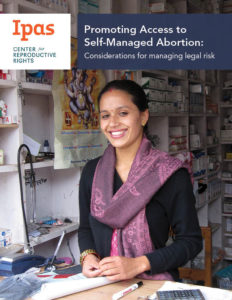
This publication, created by Ipas and the Center for Reproductive Rights, is designed to help individuals and groups consider the potential impact of abortion regulations and offer tools to help assess legal risk when supporting access to self-managed abortion.
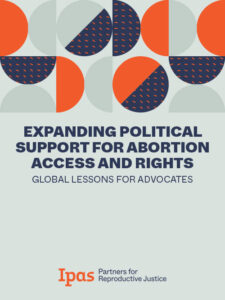
Advocating for abortion access is unlike advocacy on any other global health-care issue. This publication shares insights and lessons learned by Ipas staff and our partners around the world through decades of advocacy work to expand abortion access. The content outlines key obstacles and opportunities that advocates encounter, plus strategies for overcoming common challenges.
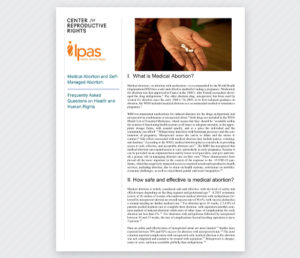
This publication from Center for Reproductive Rights and Ipas explains human rights standards that advance the right and ability to self-manage an abortion.
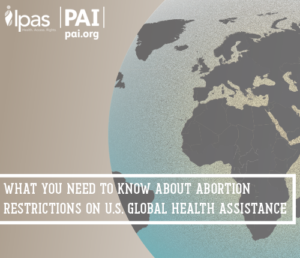
If your organization receives global health assistance (monetary and non-monetary) from the U.S. government, there may be certain types of abortion-related work that you cannot perform—and these restrictions can even limit work funded from sources other than the U.S. government.
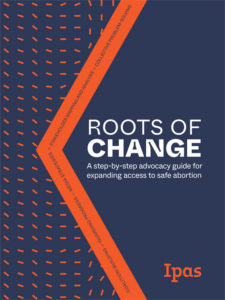
This guide is intended for advocates interested in supporting expanded access to safe abortion care in their countries. It will help you and your colleagues develop a strategy that considers the unique considerations for abortion-related advocacy. It is intended that you will work through the guide with a small group of stakeholders who are committed to working together on expanded access to safe abortion care.
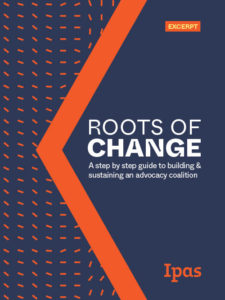
This resource is an excerpt from Ipas’s Roots of Change: a step-by-step advocacy guide for expanding access to safe abortion. The purpose of this section is to provide you with the key considerations and practical resources necessary to ensure a sustainable and well-functioning coalition for your advocacy work.
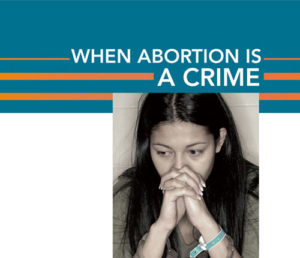
This two-page fact sheet is adapted from a 2013 Ipas report investigating the impact of criminal abortion laws on women, their families and health-care providers in three South American countries—Bolivia, Brazil and Argentina.
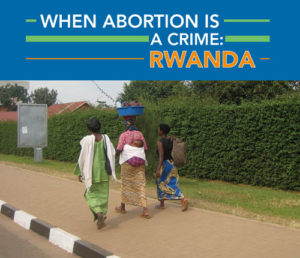
Rwanda reformed its abortion law in 2012, but legal barriers and cultural and religious stigma make it nearly impossible for women to get a safe, legal abortion. Women with unplanned or unwanted pregnancies resort to unsafe and illegal abortions—and Rwandan police unjustly harass, arrest, prosecute and imprison hundreds of women and girls on abortion or infanticide-related charges each year. This report, by Ipas and Great Lakes Initiative for Human Rights and Development, shares findings from interviews with women, judges, legal defense lawyers, and police officers, and calls on the Rwandan government to take steps to address this ongoing human rights violation.
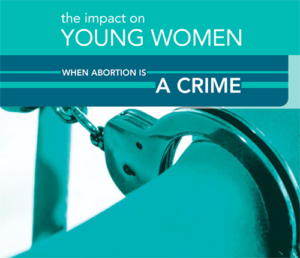
This fact sheet highlights the disproportionately high impact of criminal abortion laws on young women. In places where abortion is a crime, women who are young, poor, uneducated and facing an unwanted pregnancy are at greater risk of resorting to illegal and unsafe abortions, and consequently being investigated, arrested and prosecuted.
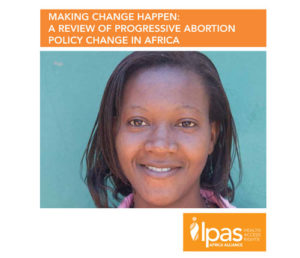
An overview of progressive abortion policy changes and trends in Africa, primarily between 2010-2016. It outlines strategies in regional policy work by Ipas and partners and points to examples of positive policy change, such as national law reform, updated standards and guidelines, commitments by policymakers, and the integration of safe abortion into regional strategies and actions plans on sexual and reproductive health and rights.
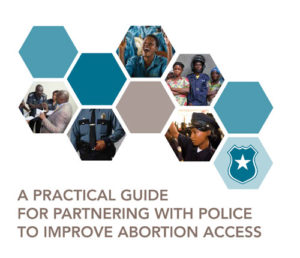
This guide is a resource for advocates, trainers, project managers and technical advisors who design programs and workshops to engage police on abortion issues. Drawing on the work of Ipas and other organizations, it offers practical strategies for partnering with police to address stigmatized issues and promote public health, with a specific focus on abortion. It can be used both in settings where abortion is legal and accessible and in settings where it is highly restricted.
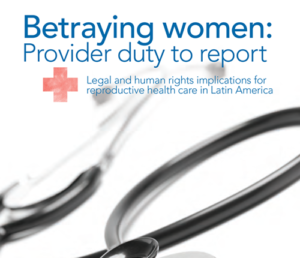
The longstanding provider-patient confidentiality relationship is quietly eroding as an alarming number of medical staff across Latin America are reporting women and girls to the police for having abortions. Many countries now require, protect or encourage medical providers to breach their confidentiality duties when they treat women seeking postabortion care. This publication covers the three main ways health-care providers are compelled to breach confidentiality, based on the varying Latin American laws governing provider obligations on the issue of abortion. It also details how such laws impact both providers and women, and lists the many international bodies, declarations, consensus documents, etc. that establish standards for protecting patient confidentiality. Finally, the publication provides recommendations for international human rights bodies, governments and health-care professionals to protect women’s right to confidentiality as well as providers’ ethical obligation to uphold that right.
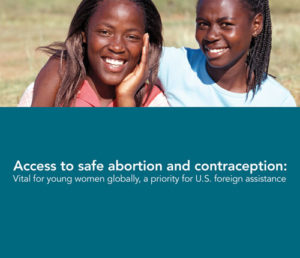
The United States, as the world’s foreign assistance leader, must play a key role in safeguarding a comprehensive and integrated approach to sexual and reproductive health and rights for young women. This fact sheet outlines policy challenges that deny young women their sexual and reproductive rights and puts forth policy actions the U.S. government should take: expand family planning funding, repeal the damaging Helms Amendment, permanently repeal the Mexico City Policy (also called the Global Gag Rule), and continue to work toward a progressive sexual and reproductive health agenda in platforms like the International Conference on Population and Development and the United Nations.
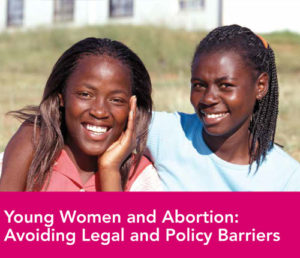
This resource is designed to help advocates and policymakers promote laws and policies that support access to safe abortion for young women. Parental involvement requirements in law or policy are common barriers that push young women toward illegal and often unsafe abortion.
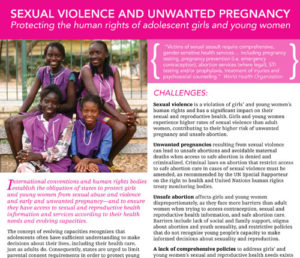
This publication provides evidence and explanation for why Ipas urges governments and policymakers to ensure that all young women—including survivors of sexual violence—have access to comprehensive sexual and reproductive health care, including safe abortion services.
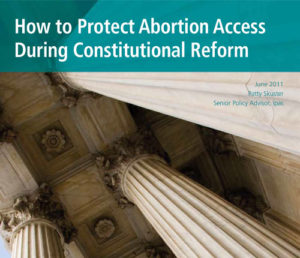
This toolkit is designed to help reproductive rights advocates participate in national constitutional reform processes. It looks at the potential consequences of constitutional protection of life at conception and outlines ways reproductive rights advocates can influence the constitutional reform process. It also may be useful for advocates facing constitutional amendments or engaging in litigation.
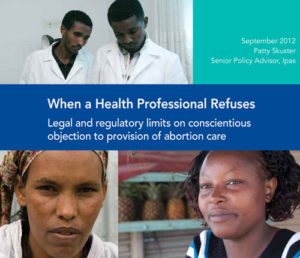
Health professionals’ refusal to provide service that they oppose on moral or religious grounds is a significant barrier to women’s access to safe abortion and other reproductive health services. This resource contains recommendations for enacting laws and regulations that safeguard women’s access to services while still protecting providers’ rights of conscience. It also provides information on human rights standards that address provider refusal and includes a list of further resources.
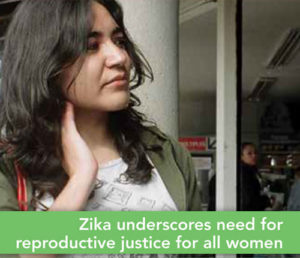
In Latin America, government responses to the Zika virus have been weak, disregarding the best interests of pregnant women and those who may become pregnant. This brief outlines Ipas’s stance on governments’ responses to the Zika crisis and women’s sexual and reproductive health needs. The brief also lists measures states can take to protect women’s health and rights during the Zika outbreak.
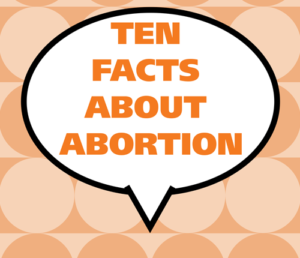
This manual serves as a quick reference guide for pro-choice advocates. The guide offers factual evidence debunking ten widely disseminated abortion myths, and provides supporting background information and resources. We hope this guide will help reproductive rights activists to confidently respond to challenges to our work and to continue advocating for abortion based on clear, scientific and unbiased data.

